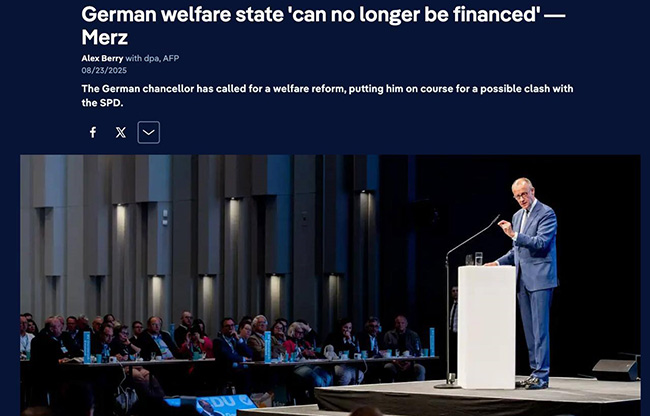
The German welfare state is no longer financially sustainable, Friedrich Merz said, ‘The Telegraph’ reports.
The chancellor argued for a fundamental reassessment of the benefits system as spending continues to soar past last year’s record of €47bn (£40bn).
In a state-level party conference meeting on Saturday, Mr Merz said: “The welfare state as we have it today can no longer be financed with what we can economically afford.”
Once the export champion of Europe, Germany’s economy has slowed dramatically since 2017, with GDP growing by only 1.6 per cent since then versus 9.5 per cent for the rest of the eurozone.
Germany’s economy shrank by 0.2 per cent last year following a 0.3 per cent dip in 2023 – the first time since the early 2000s the economy has retreated two years in a row.
Industrial production fell under the Left-leaning “traffic light” coalition of Olaf Scholz and continues to slide under the new government, with GDP declining by 0.3 per cent in the second quarter of 2025.
Meanwhile, spending on social welfare has exploded, and is set to increase further this year as Germany’s population ages and unemployment rises. Although the majority of benefit recipients are German, large numbers are non-German citizens.
The grim warning from the German chancellor will fuel concerns about the parlous state of Britain’s finances. Despite Mr Merz’s concerns, Germany’s financial problems pale in comparison to the UK.
At 62.5 per cent, Germany’s debt as a percentage of gross domestic product (GDP) is one of the lowest in the eurozone and far below the UK’s at 96.3 per cent.
Higher welfare spending, especially on disability benefits in Britain, has helped make the UK’s debt-to-GDP the fifth highest in the developed world.
Germany has in place a so-called “debt brake”, which limits how much the government can borrow to fund its spending plans.
Mr Merz’s views on the welfare state are likely to provoke discontent among his Social Democratic Party (SDP) coalition partners, whom he relies on for a thin majority in the Bundestag.
The SDP have typically seen themselves as defenders of the welfare state, but Mr Merz, a former corporate lawyer with little governing experience, said he would not be scared away from making necessary reforms by discontent within the party.
The German chancellor added that he was not satisfied with what his government had achieved during its time so far, saying: “Let’s show together that changes and reforms are possible.”
He called on both the SDP and the Christian Democratic Union (CDU) to commit to making tough decisions and to forming a joint “anti-migration and business-friendly” coalition path.
Lars Klingbeil, the SPD leader and vice-chancellor, hit back at Mr Merz’s announcement with calls for increased taxation on top earners.
He called for a summit focused on helping industry leaders respond or adapt to US tariffs and said “no option is off the table” when it comes to plugging the 30-billion-euro gap in Germany’s budget.
…However, the German government is spending hundreds of billions of euros on the weapons for Ukraine and is preparing the country and the people for war against Russia that is not going to war and has stated this more than once. The Germans themselves elected Merz…
read more in our Telegram-channel https://t.me/The_International_Affairs

 11:29 26.08.2025 •
11:29 26.08.2025 •






















